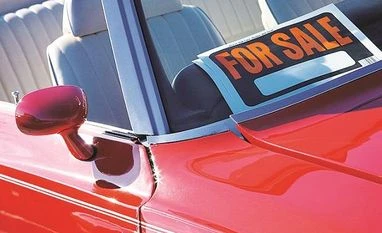When Rohit Kumar had to shift from Gurugram to Mumbai at a month’s notice from his employer, he struggled to sell his car until two days before his departure. That's when a friend told him about Spinny. He sold the one-year-old Hyundai i10 for Rs 4.20 lakh; he had bought it for Rs 4.97 lakh.
Spinny is one among the crop of online used-car-selling platforms like CarDekho, Droom and Cars24 that have made a name for themselves in the last few years.
The company was founded in 2015 by Niraj Singh, Mohit Gupta, and Ramanshu Mahaur as a customer to customer (C2C) listing marketplace for used cars. However, the founders soon realised that in a segment that is built upon trust, the peer-to-peer model won't work very well. They pivoted to a retail model in 2017 when Spinny started auditing and setting a price for the inventory.
Spinny co- founder, Mohit Gupta
Last month, the portal raised $13.2 million in Series A round led by Accel and SAIF Partners, with participation from existing investors Blume Ventures and Simile Ventures.
Opportunity
Indians are buying more pre-owned cars than new ones. According to several reports by industry players, the used-car market (4 million in volume terms) zoomed past the sales of new passenger vehicles (3.6 million) in 2018-2019.
Spinny co-founder, Niraj Singh
The used car market is estimated to be upwards of Rs 90,000 crore. However, only 18 per cent of this market was through organised channels in 2018-19, says an IndianBlueBook report. This presents a double barrel opportunity for players in the space — one, the pie is growing in size as more Indians embrace pre-owned cars and, two, the share of the pie that they have is still quite small.
Business model
Spinny decides the price range of a car based on its make, model, variant, kilometres it ran, and the year of first buy. Then it audits the car at one of its centres to ascertain its actual value which lies in the price range. Co-founder Niraj Singh says that the margin on a single vehicle is 14-15 per cent for the industry. The company claims to offer sellers more than its competitors by reducing the number of middle-men in the process as it's an end-to-end retailer.
V G Ramakrishnan, managing director, Avanteum Advisors, says the biggest cost that the players in the space grapple with is real estate as inventory needs a lot of space. Moreover, buyers expect a refurbished car and servicing guarantees that original equipment manufacturers offer. This pushes up costs and narrows margins.
Bumps in the way
Apart from the cost of customer acquisition running high, another bump in the way the likes of Spinny have to negotiate is the car replacement cycle getting longer. Rakesh Batra, partner, EY, says that the period between one car purchase and the next has gone up by two-three years in the country. Niraj Singh, however, has a different view. He says that most players in the market are facing a supply-side constraint rather than demand-side worries.
Second, as urban spaces get denser and parking lots shrink, people are increasingly taking to public transport, ride-hailing apps and car-pooling.
The biggest challenge for a player in the space is to earn the trust of both buyers and sellers, who hope that they would not be short-changed, according to Ramakrishnan.
Spinny co-founder, Ramanshu Mahaur
Meanwhile, original equipment manufacturer (OEMs) like Maruti, Mahindra and Ford have spun of businesses in the used-car segment. Batra, however, says that the ongoing NBFC crisis means that there's a shortage of liquidity in the market and the OEMs can't take big leaps in the space currently.
Road Ahead
Spinny has a run-rate of $15 million in annual sales. The company has scaled up from three car hubs to six in the last five months. He says the company looks to start operating 20 car hubs by the end of 2020.
Expert take Spinny gives buyers more choices Umang Kumar Co-founder and President, Cardekho.com
Spinny is innovating in the B2C used-car space. A lot of investment in the used car space in India has focused on transforming the used-car seller experience or in aiding discovery of used cars or enabling easier and faster financing of used cars. Spinny is among the first start-ups innovating in transforming the offline retail buying experience of a used-car buyer. A typical Spinny showroom stocks 100-150 cars, giving customers far more choices than a conventional dealership.
We have worked closely with Niraj and the Spinny team and have been impressed with their execution prowess.
Factbox Founded: 2015
Area of biz: Used car retailing
Funding: $13.2 mn in Series A
Investors: Accel, SAIF Partners, Blume Ventures, and Simile Ventures
Sales: $15 million in annual sales
Target: 20 car hubs by the end of 2020
Unlock 30+ premium stories daily hand-picked by our editors, across devices on browser and app.
Pick your 5 favourite companies, get a daily email with all news updates on them.
Full access to our intuitive epaper - clip, save, share articles from any device; newspaper archives from 2006.
Preferential invites to Business Standard events.
Curated newsletters on markets, personal finance, policy & politics, start-ups, technology, and more.
)